Concubinage and Servitude in Late
Imperial China
Concubinage and Servitude in Late Imperial China
Hsieh Bao Hua
LEXINGTON BOOKS
Lanham Boulder New York London
Published by Lexington Books
An imprint of The Rowman & Littlefield Publishing Group, Inc.
4501 Forbes Boulevard, Suite 200, Lanham, Maryland 20706
www.rowman.com
16 Carlisle Street, London W1D 3BT, United Kingdom
Copyright 2014 by Lexington Books
All rights reserved. No part of this book may be reproduced in any form or by any electronic or mechanical means, including information storage and retrieval systems, without written permission from the publisher, except by a reviewer who may quote passages in a review.
British Library Cataloguing in Publication Information Available
Library of Congress Cataloging-in-Publication Data
Hua, Hsieh Bao.
Concubinage and servitude in late imperial China / Hsieh Bao Hua.
pages cm
Includes bibliographical references and index.
ISBN 978-0-7391-4514-2 (cloth : alk. paper) -- ISBN 978-0-7391-4516-6 (electronic)
1. Concubinage--China--History. 2. Human trafficking--China--History. 3. Servants--China--History. 4. China--Social life and customs--960-1644. 5. China--Social life and customs--1644-1912. I. Title.
HQ684.H825 2014
306.3'620951--dc23
2014013474
 TM The paper used in this publication meets the minimum requirements of American National Standard for Information Sciences Permanence of Paper for Printed Library Materials, ANSI/NISO Z39.48-1992.
TM The paper used in this publication meets the minimum requirements of American National Standard for Information Sciences Permanence of Paper for Printed Library Materials, ANSI/NISO Z39.48-1992.
Printed in the United States of America
For Sinensis
Figure 1.1 Source: Fu Yiling, Ming Qing fengjian tudi suoyouzhi lungang (Shanghai, 1991), chap. 5; Hsieh Bao Hua, Market in Concubines in Jiangnan during Ming-Qing China, Journal of Family History, 33, no. 3 (2008), p. 269.
Figure 2.1 and 2.2 Source: Zhang Lu, Xiaocilu (rpt. Taibei, 1960); Xu Qianxue, Sangfukao, in Duli tongkao (in SKQSZB); Mao Qiling, Bianding jili tongsubu (in SKQSZB), juan 1, 2.
Figure 3.1 Source: Damingl jijie fuli (ML), juan 1, 19, 20, 22, 25-30; Daqing lli huitong xincuan (QC), juan 5,10, 25-33; Xue Yunsheng, Duli cunyi (Beijing, 1903), juan 43; Jing Junjian, Qingdai shehui de jianmin dengji (Zhejiang, 1993), pp. 5560.
Figure 4.1 Source: Qinding daqing huidian shili (HDL), juan 237, pp. 800801; Qinding daqing huidian (QHD), juan 2023; Qi Meiqin, Qingdai queguan zhidu yanjiu (Neimonggu, 2004), pp. 245, 254255, 258, 443448. The taxes from major customs bureaus in Zhili providence (1841 to 1848) were summarized by Wang Qingyun, Shiqu yuji (Beijing, 1985), pp. 271276.
Figure 4.2 Source: Wang Qingyun, Shiqu yuji (Beijing, 1985), juan 5, pp. 236237; Qi Meiqin, Qingdai neiwufu (Beijing, 1998, Appendix one).
Figure 5.1 Source: Mingshilu (MSL); Chiu Chung-lin, The Selection and Discharging of Royal Palace Maidservants in the Ming Dynasty, Historical Inquiry, 50 (2012), pp. 8688; Hsieh Bao Hua, From Charwoman to Empress Dowager: Serving-Women in the Ming Palace, Ming Studies, 42 (1999), pp. 3637.
Figure 5.2 and 5.3 Source: Mingshilu (MSL), Mingshi (MS), juan 113114; Hsieh Bao Hua, From Charwoman to Empress Dowager: Serving-Women in the Ming Palace, Ming Studies, 42 (1999), pp. 47, 49.
Figure 7.1 Source: Mingshi (MS), juan 113 and 114; Hsieh Bao Hua, Empress Grove: Ritual and Life in the Ming Palace, Research on Women in Modern Chinese History, 11 (2003), p. 113; Chiu Chung-lin, Mingdai linxuan houfeijiqi guizhi, Mingdai yanjiu, 11 (2008), pp. 3437.
Figure 7.2 and 7.3 Source: Mingshi (MS), juan 113, 114; Daqing yudie (AYD); Zhang Ertian. Qing leichao houfei zhuangao erjuan; Qingshigao (QSG), juan 214; Tang Bangzhi, comp. Qing huangshi sipu (Shanghai, 1923); Dong Xun and Hou Jiuxuan, Qinggong houfei (Beijing, 1993), preface, pp. 14; Hsieh Bao Hua, From Charwoman to Empress Dowager: Serving-Women in the Ming Palace, Ming Studies, 42 (1999), pp. 4549; Chen Huaxin, Zhongguo lidai houfei daguan (Shenzhen, 2000), pp. 401511.
List of Tables
Time Line of the Ming and Qing Emperors
Timeline
No. Temple titles | Reign Titles/periods | Birth Names (surnamed Zhu) |
Taizu | Hongwu (13681398) | Yuanzhang |
Huidi | Jianwen (13991402) | Yunwen |
Chengzu | Yongle (14031424) | Di |
Renzong | Hongxi (14251425) | Gaochi |
Xuanzong | Xuande (14261435) | Zhanji |
Yingzong | Zhengtong (14361449) Tianshun (14571464) | Qizheng |
Jingdi | Jingtai (14501456) | Qiyu |
Xianzong | Chenghua (14651487) | Jianshen |
Xiaozong | Hongzhi (14881505) | Youtang |
Wuzong | Zhengde (15061521) | Houzhao |
Shizong | Jiajing (15221566) | Houcong |
Muzong | Longqing (15671572) | Zaihou |
Shenzong | Wanli (15731620) | Yijun |
Guangzong | Taichang (16201620) | Changluo |
Xizong | Tianqi (16211627) | Youjiao |
Sizong | Chongzhen (16281644) | Youjian |
No. Temple titles | Reign Titles/periods | Birth Names (surnamed Aisin Gioro) |
Taizu | Tianming (16131626) | Nurgaci |
Taizong | Tiancong (16271635) Chongde (16361643) | Hongtaiji |
Shizu | Shunzhi (16441661) | Fulin |
Shengzu | Kangxi (16621722) | Xuanye |
Shizong | Yongzheng (17231735) | Yinzhen |
Gaozong | Qianlong (17361795) | Hongli |
Renzong | Jiaqing (17961820) | Yongyan |
Xuanzong | Daoguang (18211850) | Minning |
Wenzong | Xianfeng (18511861) | Yizhu |
Muzong | Tongzhi (18621874) | Zaichun |
Dezong | Guangxu (18751908) | Zaitian |
None | Xuantong (19091911) | Puyi |
Acknowledgments
My doctoral advisor and intellectual mentor Patricia Buckley Ebrey has my deepest appreciation. Through my several years as her graduate student and research assistant, she stimulated my early interest in gender studies and has remained a constant source of encouragement throughout my career. A renowned researcher for traditional Chinese sociocultural history I have complimented, her accomplishments were the inspiration for my project. Chow Kai-wing has also played a vital role as my mentor. As a prominent specialist in Ming intellectual and cultural history, he suggested valuable research methods and offered incisive comments on my dissertation. His kind support for my career has been most appreciated. I have long looked forward to the day when I could express my gratitude to both of these teachers for their invaluable gifts to me. The late Lloyd E. Eastman was another teacher who generously offered several independent study courses to shape my knowledge in political history. His influence in my graduate years was obvious, and even in those cases where I disagreed with him, he had my profound respect.
Next page
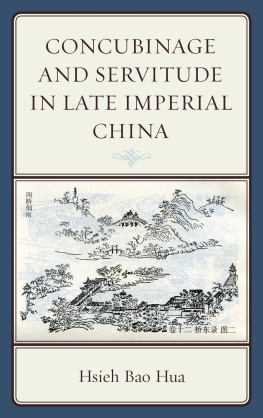

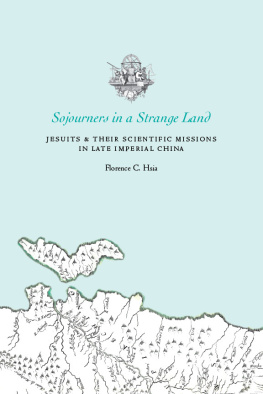
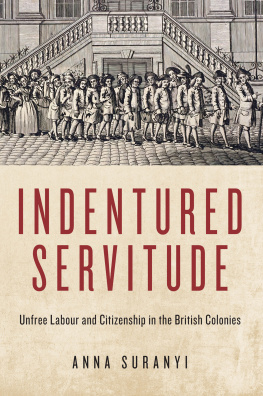
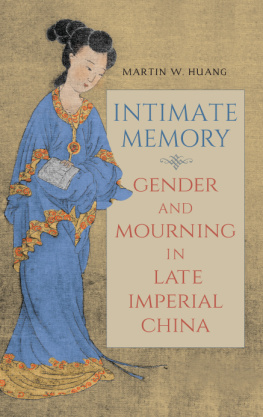
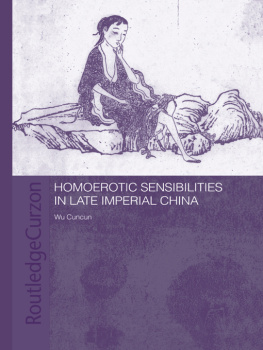
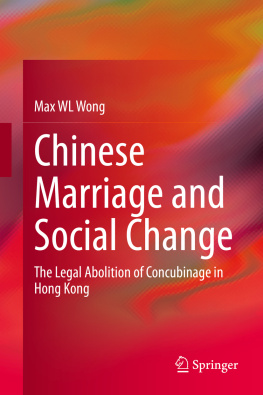
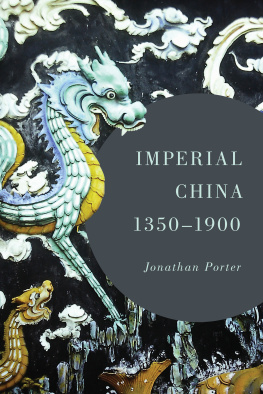
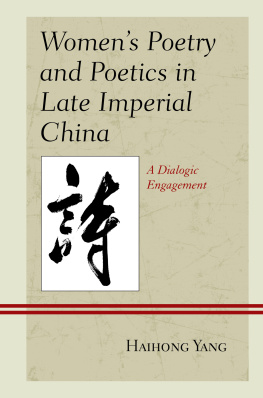
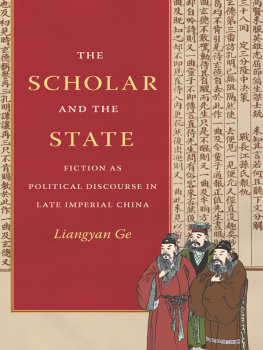
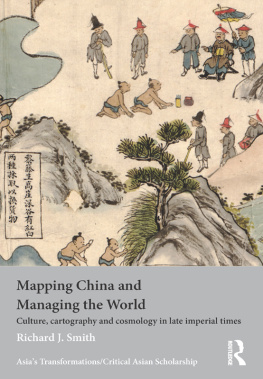
 TM The paper used in this publication meets the minimum requirements of American National Standard for Information Sciences Permanence of Paper for Printed Library Materials, ANSI/NISO Z39.48-1992.
TM The paper used in this publication meets the minimum requirements of American National Standard for Information Sciences Permanence of Paper for Printed Library Materials, ANSI/NISO Z39.48-1992.